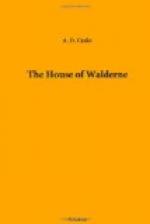Night reigned without the occasional challenge of the sentinel alone broke the hush which brooded during the hours of darkness over the host encamped at Walderne.
Morning broke with roseate hues. All nature seemed to arise at once. The trumpets gave their shrill signal, the troops arose to life and action, like bees when they swarm; the birds filled the woods with their songs, as the glorious orb of day arose over the eastern hills.
Breakfast was the first consideration, which was heartily yet hastily despatched. Then in the hall, their hands bound behind them, stood the three prisoners; the knight dejected, the mayor and friar pale with privation and suffering. Our Martin’s health was not strong enough to enable him well to bear the horrors of a dungeon.
“You are accused of rebellion,” said the stern Edward, as he faced them. “What is your answer?”
Few men dared to look into that face. Its frown was so awful, it is recorded that a priest upon whom he looked once in displeasure and anger, died of fear—yet he was never intentionally unjust.
Ralph spoke first—he felt that courageous avowal of the truth was the only course.
“My prince,” he said, “we must indeed avow that our convictions are with the free barons of England, and that with them we must stand or fall. If to share their sentiments is rebellion, rebels we are, but we disclaim the word.”
“And thou, Sir Mayor?”
“I am but the mouthpiece of my fellow citizens. I have no freewill to choose.”
“And thou, friar of orders grey?”
“Like all my brethren, I hold the cause of the Earl of Leicester just,” said Martin quietly.
Like the stark and stern conqueror of two centuries before, Edward respected a man, and he stifled his rising anger era he replied:
“They are traitors, but I scorn to crush three men who (save the burgess, perhaps) will not lie to save their forfeit necks, while fifteen thousand men are in the field to maintain the like with their swords. I will measure myself with the armed ones first, then I may deal with knight, mayor, and friar. Till then, keep them in ward.”
Drogo was deeply disappointed. He had hoped to witness the execution of Martin, which he could not carry out himself, owing to the “superstitious” scruples of his followers, and to gain this he would have sacrificed the ransoms of the other two. He loved gold, but loved revenge more; and hatred was with him a stronger passion than avarice.
And now the trumpets were blown, the banners waved in air, the royal army moved forward for Lewes, and prominent in its ranks were the newly-made knight and his followers.
He left his victims in durance, remitted to their dungeons—the only chance of getting rid of Martin seemed secret murder. But before starting from home he left secret instructions, which will disclose themselves ere long.




